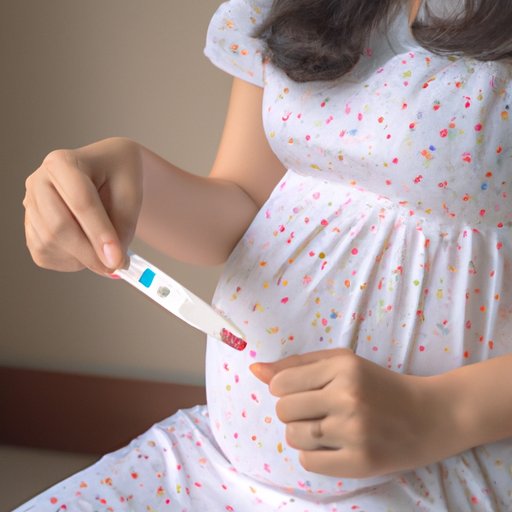Introduction
When you think you might be pregnant, it can be hard to know what to do or where to start. There are many potential signs and symptoms that you may experience, and it can be difficult to determine which ones are related to pregnancy. In this article, we will explore some of the most common signs and symptoms of pregnancy, as well as how to take a home pregnancy test to confirm your results. By taking the time to understand these key points, you can feel more confident in your decision-making process.
Missed Period
One of the most obvious signs of pregnancy is a missed period. According to the American College of Obstetricians and Gynecologists (ACOG), a missed period is one of the earliest and most reliable signs of pregnancy. If your period is usually regular and you suddenly miss one, it is possible that you may be pregnant. It is important to remember, however, that a missed period can also be caused by other factors such as stress, illness, or changes in diet or exercise habits.
In addition to a missed period, there are other signs that may accompany a missed period. These include breast tenderness, frequent urination, fatigue, and light spotting. All of these signs can help provide further confirmation that you might be pregnant.
Abdominal Cramping
Another common symptom of pregnancy is abdominal cramping. This type of cramping typically begins in the first trimester and can range from mild to severe. Common symptoms include pain in the lower abdomen, backache, and increased sensitivity to pressure. Some women may also experience light bleeding or spotting during this time.
Breast Tenderness/Changes
Another sign of pregnancy is changes in your breasts. During pregnancy, your body produces hormones that cause your breasts to become larger and tender to the touch. The nipples may also darken and the area around them may become larger. Other changes may include increased sensitivity and a tingling sensation in the breasts.
Nausea/Vomiting
Nausea and vomiting are also common symptoms of pregnancy. This condition is often referred to as “morning sickness” although it can occur at any time of the day. Symptoms of morning sickness can range from mild to severe and may include nausea, vomiting, dizziness, and food cravings.
Fatigue
Fatigue is another common symptom of pregnancy. As your body adjusts to the hormonal changes, you may find yourself feeling more tired than usual. Fatigue can range from mild to extreme, and it is important to get enough rest and eat a balanced diet to help manage your energy levels.
Positive Pregnancy Test
The only way to confirm a pregnancy is through a positive pregnancy test. Home pregnancy tests are widely available and are usually accurate if used correctly. To take a home pregnancy test, you will need to collect a urine sample and then place the test stick into the sample. Results will appear within minutes, and it is important to read the instructions carefully before use.
If the test is positive, it is important to make an appointment with your doctor as soon as possible. Your doctor will be able to provide further information about the pregnancy and discuss next steps.
Conclusion
Pregnancy can be a confusing and overwhelming experience, but understanding the signs and symptoms can help you make informed decisions. A missed period is one of the earliest and most reliable signs of pregnancy, and other symptoms such as abdominal cramping, breast changes, nausea, vomiting, and fatigue can also provide further confirmation. The only way to confirm a pregnancy is through a positive pregnancy test, so it is important to take the time to understand how to take one correctly and what to do if the test is positive.
(Note: Is this article not meeting your expectations? Do you have knowledge or insights to share? Unlock new opportunities and expand your reach by joining our authors team. Click Registration to join us and share your expertise with our readers.)
